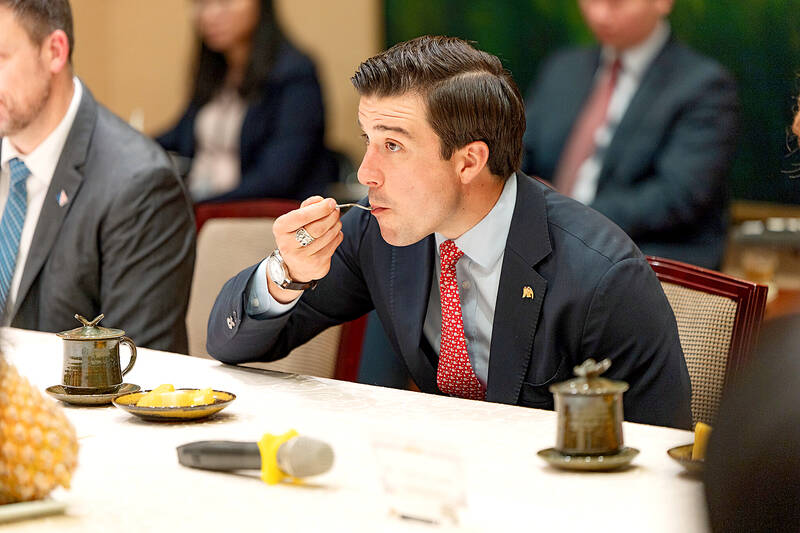Taiwan has agreed to buy US$10 billion of US agricultural products over the next four years in exchange for exporting the nation’s pineapples, the Presidential Office said amid tariff negotiations with Washington.
President William Lai (賴清德) unveiled the deal at a meeting with an agricultural delegation headed by US Undersecretary of Agriculture for Trade and Foreign Agricultural Affairs Luke Lindberg, the office said in a statement on Tuesday evening.
The deal to import US-produced soybeans, corn, wheat and beef would improve the productivity of Taiwanese agriculture by improving the quality of its animal feed, as well as improving the nation’s food security, the office said, citing Lai.

Photo: CNA
A Taiwanese agricultural delegation has visited several breadbasket states in the US, including South Dakota, Lindberg’s home state, Lai said, adding that the exchange of delegations signaled Taiwan’s commitment to the bilateral economic partnership.
Taiwan is the seventh-biggest trade partner of the US and the seventh most important buyer of its agricultural exports, he said.
As a reliable and trustworthy friend of the US in the semiconductor industry, Taiwan wishes to enhance bilateral collaboration toward introducing innovative technology in its agricultural sector and food supply resilience, Lai said.
Taiwan’s strategic position in the first island chain and its ability to contribute to decoupling global supply chains from China underscores the importance of cooperation among like-minded nations to world peace and prosperity, he said.
The visit of Lindberg’s delegation — which showcases the depth of collaboration between the private and public sectors in Taiwan and the US — symbolizes the strength of the two nations’ strategic economic partnership, Lai said.
Lindberg expressed his gratitude to Taiwanese consumers for buying up to 25 percent of their foodstuff from US farmers, the statement said.
As a friend of Taiwan, the US is committed to bolstering the nation’s resilience by contributing to its supply of food and energy, Lindberg said.
Separately, Minister of Agriculture Chen Junne-jih (陳駿季) yesterday said that officials expect the US to approve imports of Taiwanese pineapples before the next harvest, which starts in March next year.
Most of the technical and legal hurdles involved in obtaining approval for sale of the fruit in the US have been overcome since the government began preparing for the move in September last year, Chen said.
Taiwan initiated the process to export pineapples to the US shortly after 2021, when China banned their sale, he said, adding that members of the US delegation who visited Taiwanese orchards were satisfied with their sanitation standards.
Taiwanese pineapples compare favorably in sweetness and juiciness to their Central and Southern American counterparts that hold sway in the US market, he said.
Most Taiwanese pineapple cultivars certified to be pest-free would be exempt from chemical and non-chemical treatment typically required of fruit imported by the US, the Bureau of Animal and Plant Health Inspection and Quarantine said, citing comments by US officials.
Details of the quarantine procedures for Taiwanese pineapples are still being determined, the bureau added.
Additional reporting by Yang Yuan-ting

NATIONAL SECURITY THREAT: An official said that Guan Guan’s comments had gone beyond the threshold of free speech, as she advocated for the destruction of the ROC China-born media influencer Guan Guan’s (關關) residency permit has been revoked for repeatedly posting pro-China content that threatens national security, the National Immigration Agency said yesterday. Guan Guan has said many controversial things in her videos posted to Douyin (抖音), including “the red flag will soon be painted all over Taiwan” and “Taiwan is an inseparable part of China,” while expressing hope for expedited “reunification.” The agency received multiple reports alleging that Guan Guan had advocated for armed reunification last year. After investigating, the agency last month issued a notice requiring her to appear and account for her actions. Guan Guan appeared as required,

A strong cold air mass is expected to arrive tonight, bringing a change in weather and a drop in temperature, the Central Weather Administration (CWA) said. The coldest time would be early on Thursday morning, with temperatures in some areas dipping as low as 8°C, it said. Daytime highs yesterday were 22°C to 24°C in northern and eastern Taiwan, and about 25°C to 28°C in the central and southern regions, it said. However, nighttime lows would dip to about 15°C to 16°C in central and northern Taiwan as well as the northeast, and 17°C to 19°C elsewhere, it said. Tropical Storm Nokaen, currently

PAPERS, PLEASE: The gang exploited the high value of the passports, selling them at inflated prices to Chinese buyers, who would treat them as ‘invisibility cloaks’ The Yilan District Court has handed four members of a syndicate prison terms ranging from one year and two months to two years and two months for their involvement in a scheme to purchase Taiwanese passports and resell them abroad at a massive markup. A Chinese human smuggling syndicate purchased Taiwanese passports through local criminal networks, exploiting the passports’ visa-free travel privileges to turn a profit of more than 20 times the original price, the court said. Such criminal organizations enable people to impersonate Taiwanese when entering and exiting Taiwan and other countries, undermining social order and the credibility of the nation’s

‘NATO-PLUS’: ‘Our strategic partners in the Indo-Pacific are facing increasing aggression by the Chinese Communist Party,’ US Representative Rob Wittman said The US House of Representatives on Monday released its version of the Consolidated Appropriations Act, which includes US$1.15 billion to support security cooperation with Taiwan. The omnibus act, covering US$1.2 trillion of spending, allocates US$1 billion for the Taiwan Security Cooperation Initiative, as well as US$150 million for the replacement of defense articles and reimbursement of defense services provided to Taiwan. The fund allocations were based on the US National Defense Authorization Act for fiscal 2026 that was passed by the US Congress last month and authorized up to US$1 billion to the US Defense Security Cooperation Agency in support of the